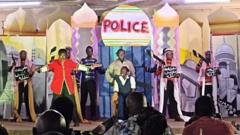The national high school drama competition in Kenya became a scene of chaos when police fired tear gas amid protests over a controversial play called "Echoes of War." Students demanded the release of the detention of its author, highlighting political tensions and calls for freedom of expression.
Tear Gas and Tensions: Drama Competition Turns Chaotic in Kenya

Tear Gas and Tensions: Drama Competition Turns Chaotic in Kenya
A high school drama competition in Kenya faced violent disruption as police used tear gas to disperse crowds surrounding a politically charged play.
Kenya's national high school drama competition recently took a chaotic turn when police deployed tear gas to scatter large crowds that had assembled to watch a politically charged performance titled "Echoes of War." The play, centered on disillusioned youth in a fictional kingdom grappling with issues of leadership, draws parallels with last year's protests against rising taxes led by young Kenyans.
The script of "Echoes of War," crafted by Cleophas Malala, a prominent opposition figure and former senator, faced a backlash when it was initially disqualified from the festival. However, a High Court ruling overturned this decision, allowing it to be included in the competition. Tensions escalated on Thursday morning in Nakuru when students exited the venue, demanding Malala's release from police detention, which had prevented him from engaging in final rehearsals with the students from Butere Girls School.
Following his eventual release without charges, Malala praised the courage of the Butere Girls, labeling their actions as "an act of heroic restoration." He expressed his commitment to ensuring "Echoes of War" is showcased before audiences in Kenya, reflecting the pivotal themes of protest and youth empowerment.
In the wake of these events, anti-riot police, equipped with batons and tear gas canisters, sealed off the venue, causing discontent among participating students. One of the girls voiced their exasperation, questioning, "There's no audience. Who are we performing for?" Students voiced their complaints about police harassment that had escalated due to the circumstances surrounding the play.
The Education Minister, Julius Ogamba, expressed concern regarding Malala's involvement, questioning the suitability of a politician acting as a scriptwriter for student performances. Furthermore, Interior Minister Kipchumba Murkomen admonished against using students for political agendas, asserting the necessity of keeping education and politics separate.
The situation has incited public outrage, prompting Amnesty International to note a concerning trend of state-sponsored repression regarding free expression and press freedoms in Kenya. Chief Justice Martha Koome criticized Malala's detention, stating it violated court orders that protected his right to participate in the competition, emphasizing the importance of adhering to the rule of law.
The episode has ignited fierce criticism from political opposition figures such as Kalonzo Musyoka, who condemned the police's aggressive tactics, praising the students for their defiance. The opposition Orange Democratic Movement (ODM) has rallied for the students' right to perform, echoing a call for fair treatment amid the turbulent political landscape.





















